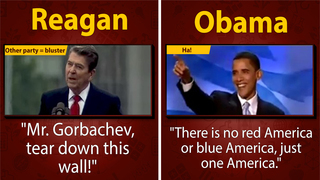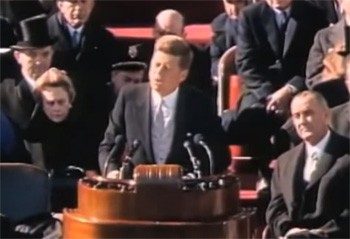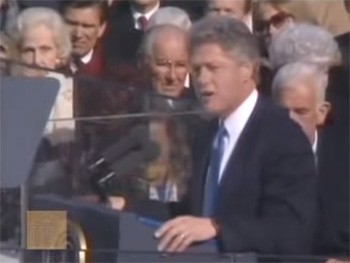6 Inspiring Political Quotes From History (That Today Would Be Mocked Mercilessly)

"The only thing we have to fear is fear itself." -- Franklin Delano Roosevelt
"Ask not what your country can do for you; ask what you can do for your country" -- John Fitzgerald Kennedy
"I did not have sexual relations with that woman, Ms. Lewinsky." -- Bill Clinton
Don't Miss
The above joke was considered hilarious when I was a kid. Today, "Grab her by the pussy" subs in as the more contemporary punchline, but the setup remains unchanged: "Look at these past presidents' eloquence! We would have more inspiring rhetoric like that if today's leaders measured up, but instead, just look what we're stuck with."
Yet no matter who's president, we're not going to fawn over their words like we do their predecessors'. We're too jaded for that. Just imagine how people would react now if the president said ...
"The Only Thing We Have To Fear Is Fear Itself."
The original context:
It was March 4, 1933, and Franklin D. Roosevelt was being inaugurated as America's 32nd president. In his address, FDR warned people against, "nameless, unreasoning, unjustified terror which paralyzes needed efforts to convert retreat into advance." And boy did his words resonate.
Said one woman, named Sarah Love, "Any man who can talk like that in times like these is worthy of every ounce of support a true American has." Who was Sarah Love? No one in particular, but like a perfect tweet that the news cherry-picks to illustrate a point, her quote is forever recorded to sum up the world's reaction.

How we'd respond now:
We are now immune to presidential rhetoric, particularly in inaugural addresses, which never say anything substantial. Oh, if your candidate is elected president, perhaps you will be moved again and again by what they say, starting on day one. But a president's rehearsed speech isn't going sway people overall, isn't going to sway people who never liked him in the first place.
Were a president today (who we don't already blindly support) to say "there's nothing to fear but fear itself," we'd be furious. "How dare you downplay our problems!" people would say. "There are all kinds of things to fear, and you're clearly just brushing them off because you want us to think you've got things under control!" If it sounds like I'm alluding to President Trump downplaying COVID, I'm not defending him. But I do think we'd now interpret any president's summary of the state of the union as self-serving, and we'd generally be right to.

We have plenty to fear today, and they in fact had even more to fear in 1933 when FDR said these words. Not only was King Kong about to attack New York, but the Great Depression was just about as bad as it would get. A quarter of workers were unemployed. Wages had dropped by half in just a couple years, as had the nation's industrial output. Maybe 4 percent of the population was homeless. All of which is (duh) precisely why FDR said those words, but it's also why a sufficiently cynical audience would refuse to accept them.
Even if people took the words to heart and escaped the bad consequences of counterproductive panic, many faced poverty and death. And if they made it to the end of the decade, they had World War II to look forward to, so that's at least one thing to fear in addition to fear itself.
"Ask Not What Your Country Can Do For You; Ask What You Can Do For Your Country."
The original context:
Here's another inaugural address, this one from John F. Kennedy. Once again, it was a notable period in America, this time the height of the Cold War, and along with informing Americans that with great power comes great responsibility, JFK took the opportunity to call everyone to public service.

How we'd respond now:
Like I said, we don't get inspired by quotes from inaugural addresses anymore. We haven't for decades. Take the following words that express the same message of duty: "I ask you to seek a common good beyond your comfort; to defend needed reforms against easy attacks; to serve your nation, beginning with your neighbor. I ask you to be citizens: citizens, not spectators; citizens, not subjects; responsible citizens, building communities of service and a nation of character." Those are from the inaugural address of George W. Bush. Not only were they instantly forgotten, but they did nothing to change Bush's reputation as a bumbling idiot.
Of course, that Bush quote doesn't quite have the wit and structure of the JFK one -- but today, that's actually a good thing. The particular construction JFK used (x blah blah y, contrast, y blah blah x) has a name (an antimetabole). We've heard it used so much in comedy, from "in Soviet Russia" jokes to Chuck Norris jokes to being parodied in Mystery Men, that it has no chance of seriously moving us. It barely even works as a joke now, since it comes off too much like a dead meme.

*crickets chirping*
As for the message of the quote, if a president we don't like says it now, we'd be all, "Screw you. We elected you to help us. How dare you shush our demands!" Especially if it's conservative listeners reacting to a leftist politician: "You want us all to give up and just work for the People? So you're telling us all to go Communist now?" There was even a candidate in one of this last year's Democratic debates (please don't make me go through all the transcripts to see which one) who said something like, "We've done enough for Washington, it's time to find out what Washington will do for us," and it seemed like the most natural thing to say.
And speaking of debates, and Kennedy ...
"Senator, You're No Jack Kennedy"
The original context:
This is the most famous presidential debate quote ever. Veep nominee Dan Quayle was facing his 1988 opponent in a debate moderated by Tom Brokaw and Brit Hume. Quayle invoked John F. Kennedy, and his opponent Lloyd Bentsen said, "Senator, I served with Jack Kennedy. I knew Jack Kennedy. Jack Kennedy was a friend of mine. Senator, you're no Jack Kennedy." The crowd went wild.
In just a couple years, Ronald Reagan would mock comparisons between Bill Clinton and Thomas Jefferson as well as poke fun at his own age by saying, "I knew Thomas Jefferson. He was a friend of mine. And Governor, you're no Thomas Jefferson." That was a joke of course, as are most references to the quote since then. But all such jokes are based on how powerful and influential the original quote was.
How we'd respond now:
Maybe we'll pump our fist if our candidate gets the good line in. And maybe today, the crowd in the room would still go wild. But today, we all have real-time commentary from sources other than the room's audience, and we're rightly skeptical of anything in debates that panders to those there in person and gets them hooting.
And in fact, even at the time, the moderator responded by trying to quiet the crowd. "Please, please," said Judy Woodruff, "once again, you're only taking time away from your own candidate" -- these are the exact words moderators use now, and we now side with the mods and wish the crowd would shut up so we can get back to the stuff that matters. Also, Dan Quayle's response received nearly as much applause as Bentsen's: "That was really uncalled for, Senator."
Quayle was right about that. The question had been about if Quayle's resume qualified him to be president should Bush die, and he responded that he'd served as much time in Congress as JFK had when he ran for president. Which is a winning response. He wasn't saying he was Kennedy's equal overall (apparently he'd likened himself to JFK in private, which was why Bentsen had prepared that response, but he wasn't doing to now). So his opponent's counter -- "oh, so you're Kennedy now? Also, Kennedy was my BFF" -- was borderline nonsense.
Quayle had to console himself by, well, winning that election. As vice president, he was a laughingstock (if '90s sitcoms are a good source on the matter), but as for Lloyd Bentsen, I'm guessing many of you never heard his name before today.

"At Long Last, Have You Left No Sense Of Decency?"
The original context:
In the 1950s, Senator Joseph McCarthy claimed (falsely) that he had a list of Communists who'd infiltrated Washington, and over the next years, he moved from investigating the State Department to investigating the Army. McCarthy's counsel then used this investigation to pressure the Army into going easy on a buddy of his who'd been drafted, and while this last part sounds like small potatoes compared to modern-day corruption, it was enough to call a Senate hearing to figure out what was going on.
The lawyer questioning McCarthy was Joseph Welch, and the Army had replaced another lawyer for alleged Communist ties. McCarthy brought up this replaced lawyer during testimony, and Welch said, "Let us not assassinate this lad further, Senator; you've done enough. Have you no sense of decency, sir? At long last, have you left no sense of decency?"
Today, everyone wishes someone would once again have enough courage to call for a restoration of decency in Washington.

How we'd respond now:
Despite what all those awaiting such a call say, we actually get calls like that all the time. Like there was Lindsey Graham shaming everyone in the Senate for discussing drinking and sex. Or you've got Marco Rubio sounding very reasonable calling on politicians to keep things civil. Only, Graham was trying to silence people from pressing credibly accused Supreme Court nominee Brett Kavanaugh. And Rubio was seeking to stop Elizabeth Warren from quoting Coretta Scott King about Jeff Sessions being too racist to confirm as attorney general.
Politicians rarely genuinely wish for improved discourse. They wish for an atmosphere in which they can achieve their particular partisan goals. Any other politician calling for civility from opponents would have their motives interpreted the same way.

"HAVE YOU NO SENSE OF DECENCY, SIR?!"
Maybe there is some Senator Tom Hanks out there who genuinely wishes we'd all get along, but the legend of the quote is that someone can again call for a return to decency and everyone will actually change their views and policies accordingly. No one's going to do that. They didn't even do that following Welch's original line. First off, as you can see from the little summary we gave, it was a very specific criticism of one of McCarthy's lines of questioning during one scandal, not really a broad indictment of what we now know as McCarthyism. McCarthy was already losing popularity, and though McCarthy's reign soon ended, anti-Commie paranoia did not.
The line had no effect at the time, either on McCarthy or McCarthyism. We only believe it did because a famous documentary spliced it to make it sound like it was the climax of the hearings. We really like imagining that quotes are lines worthy of Hollywood actors. For example ...
"Mr. Gorbachev, Tear Down This Wall!"
The original context:
Ronald Reagan took a trip to Berlin in 1987, and he gave a speech right at the famous Brandenburg Gate. The people of Berlin were not unanimously happy to see him. You might imagine that Communist East Berlin had some ill feelings toward the US president, but tens and thousands in West Berlin protested him as well and were barred from attending the speech.
Calling for the reunification of Germany, Reagan said, "General Secretary Gorbachev, if you seek peace, if you seek prosperity for the Soviet Union and Eastern Europe, if you seek liberalization, come here to this gate. Mr. Gorbachev, open this gate. Mr. Gorbachev ... Mr. Gorbachev, tear down this wall!"

Gorbachev was not in fact present at the event, but the words must have echoed across the globe because in short time, the wall fell. Hooray!
How we'd respond now:
As always, we'd cheer the line on if our guy said it. But a president from the other party? It would sound like bluster from someone stupidly trying to sound strong. International policy change comes through careful diplomacy, not shouting commands to a large crowd, addressing an absent third party.
Picture a president tweeting out in all caps, "CHAIRMAN XI, NO MORE GENOCIDE!" To be sure, this would be hugely better than supporting genocide, but it's also an empty command unlikely to accomplish anything.

This isn't just my thoughts -- I don't know anything about international relations. The fact is, even at the time, Reagan advisers like Colin Powell cautioned against the line, which they said would come across as unpresidential. The Soviet press called the line warmongering. The US press, on the other hand, barely reported on the speech at all.
The speech had no effect. The wall didn't come down till years later, once Reagan was out of office, and it's unclear if US pressure had much to do with its fall. Only afterward, once the fantasy of the fallen wall was a reality, was the line dredged up and retroactively revered.
"There Is No Red America Or Blue America, Just One America."
The original context:
This quote's a lot more recent than the others, and yet even 2004 feels like a bygone era in many ways. During that year's Democratic convention, a state senator named Barack Obama galvanized the crowd and also jump-started his own political career with a call for unity in his keynote address. This led him to later become president, and therefore led to everything that happened once he stopped being president, so thanks Obama.
Though, funny thing: He never said, "There is no red America or blue America, just one America" or "There are no red states or blue states, just the United States." People walked away from his speech with that idea in their heads, and they'd attribute it to him in the years to come, and he'd say and tweet this later, but he didn't actually say it then. He was going to, but John Kerry removed the line so he could say something similar himself. "That fucker is trying to steal a line from my speech," Obama said on the way home, according to an aide.

via Wiki Commons
But no matter the words he used, people got the message. And it wasn't just "I'll be a president to all Americans" (the bare minimum you can expect from a politician) "so vote for me!," the way you might hear the line used today. It was telling people to stop seeing each other as opponents, because we're a lot more alike, in values and even in political positions, than extremists would have us believe.
How we'd respond now:
"Ha! Don't you try and 'both sides' this. It's clear that there are absolutely opposing factions here, and any compromise between good and evil only serves evil. There's our side, the side that actually cares about true American values. And then there's the other side, which is corrupt beyond repair. If you deny this, you're either naive or corrupt yourself. The only one way to unite America is if all of them concede that they're wrong and agree to flip. Barring that? Well, we're just going to have to have expand our reach enough that they never get to dictate terms to us again!"
That's right: We're saying that both sides would accuse that quote of trying to ‘both sides’ the issue. So, uh, yeah. In addition to be being apocryphal, that quote had the lifespan of a cocker spaniel. Yikes.
Follow Ryan Menezes on Twitter for more stuff no one should see.